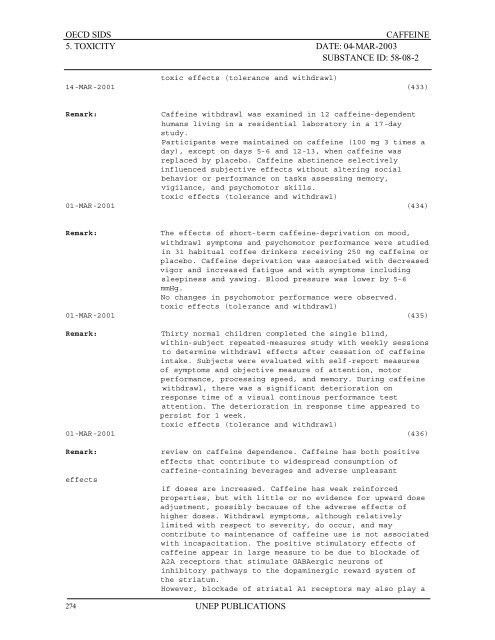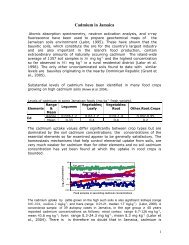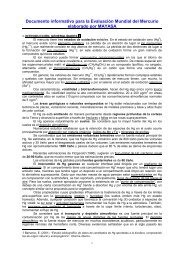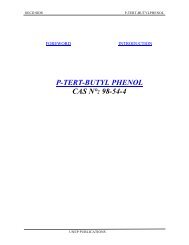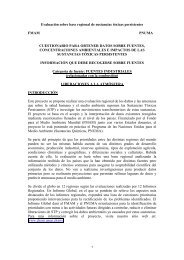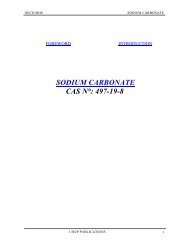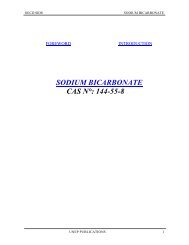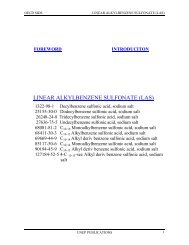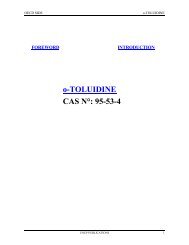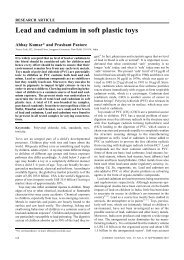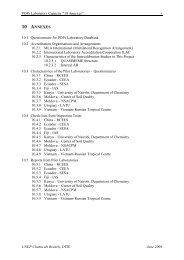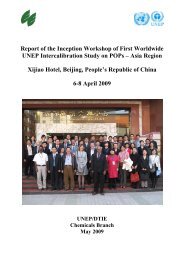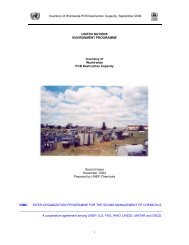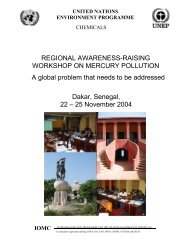- Page 1 and 2:
OECD SIDS CAFFEINE FOREWORD INTRODU
- Page 3 and 4:
OECD SIDS CAFFEINE lead company BAS
- Page 5 and 6:
OECD SIDS CAFFEINE Caffeine metabol
- Page 7 and 8:
OECD SIDS CAFFEINE FULL SIDS SUMMAR
- Page 9 and 10:
OECD SIDS CAFFEINE 5.9 Developmenta
- Page 11 and 12:
OECD SIDS CAFFEINE 1 IDENTITY SIDS
- Page 13 and 14:
OECD SIDS CAFFEINE Caffeine is prod
- Page 15 and 16:
OECD SIDS CAFFEINE The elimination
- Page 17 and 18:
OECD SIDS CAFFEINE Case reports and
- Page 19 and 20:
OECD SIDS CAFFEINE 3.1.1.5.2 Low bi
- Page 21 and 22:
OECD SIDS CAFFEINE Based on two coh
- Page 23 and 24:
OECD SIDS CAFFEINE No valid data av
- Page 25 and 26:
OECD SIDS CAFFEINE 3.1.6 Genetic To
- Page 27 and 28:
OECD SIDS CAFFEINE There were no st
- Page 29 and 30:
OECD SIDS CAFFEINE Task 3 (crossove
- Page 31 and 32:
OECD SIDS CAFFEINE 3.1.9 Developmen
- Page 33 and 34:
OECD SIDS CAFFEINE schedule) were r
- Page 35 and 36:
OECD SIDS CAFFEINE 5 Conclusions an
- Page 37 and 38:
OECD SIDS CAFFEINE Workplace: Takin
- Page 39 and 40:
OECD SIDS CAFFEINE (00/0360/21/1),
- Page 41 and 42:
OECD SIDS CAFFEINE Goldstein A., Wa
- Page 43 and 44:
OECD SIDS CAFFEINE Maihles J. B. et
- Page 45 and 46:
OECD SIDS CAFFEINE Rivenes S.M., et
- Page 47 and 48:
OECD SIDS CAFFEINE Date of the lite
- Page 49 and 50:
OECD SIDS CAFFEINE Existing Chemica
- Page 51 and 52:
OECD SIDS CAFFEINE 1. GENERAL INFOR
- Page 53 and 54:
OECD SIDS CAFFEINE 1. GENERAL INFOR
- Page 55 and 56:
OECD SIDS CAFFEINE 1. GENERAL INFOR
- Page 57 and 58:
OECD SIDS CAFFEINE 1. GENERAL INFOR
- Page 59 and 60:
OECD SIDS CAFFEINE 1. GENERAL INFOR
- Page 61 and 62:
OECD SIDS CAFFEINE 2. PHYSICO-CHEMI
- Page 63 and 64:
OECD SIDS CAFFEINE 2. PHYSICO-CHEMI
- Page 65 and 66:
OECD SIDS CAFFEINE 2. PHYSICO-CHEMI
- Page 67 and 68:
OECD SIDS CAFFEINE 2. PHYSICO-CHEMI
- Page 69 and 70:
OECD SIDS CAFFEINE 3. ENVIRONMENTAL
- Page 71 and 72:
OECD SIDS CAFFEINE 3. ENVIRONMENTAL
- Page 73 and 74:
OECD SIDS CAFFEINE 3. ENVIRONMENTAL
- Page 75 and 76:
OECD SIDS CAFFEINE 3. ENVIRONMENTAL
- Page 77 and 78:
OECD SIDS CAFFEINE 4. ECOTOXICITY D
- Page 79 and 80:
OECD SIDS CAFFEINE 4. ECOTOXICITY D
- Page 81 and 82:
OECD SIDS CAFFEINE 4. ECOTOXICITY D
- Page 83 and 84:
OECD SIDS CAFFEINE 4. ECOTOXICITY D
- Page 85 and 86:
OECD SIDS CAFFEINE 4. ECOTOXICITY D
- Page 87 and 88:
OECD SIDS CAFFEINE 4. ECOTOXICITY D
- Page 89 and 90:
OECD SIDS CAFFEINE 5. TOXICITY DATE
- Page 91 and 92:
OECD SIDS CAFFEINE 5. TOXICITY DATE
- Page 93 and 94:
OECD SIDS CAFFEINE 5. TOXICITY DATE
- Page 95 and 96:
OECD SIDS CAFFEINE 5. TOXICITY DATE
- Page 97 and 98:
OECD SIDS CAFFEINE 5. TOXICITY DATE
- Page 99 and 100:
OECD SIDS CAFFEINE 5. TOXICITY DATE
- Page 101 and 102:
OECD SIDS CAFFEINE 5. TOXICITY DATE
- Page 103 and 104:
OECD SIDS CAFFEINE 5. TOXICITY DATE
- Page 105 and 106:
OECD SIDS CAFFEINE 5. TOXICITY DATE
- Page 107 and 108:
OECD SIDS CAFFEINE 5. TOXICITY DATE
- Page 109 and 110:
OECD SIDS CAFFEINE 5. TOXICITY DATE
- Page 111 and 112:
OECD SIDS CAFFEINE 5. TOXICITY DATE
- Page 113 and 114:
OECD SIDS CAFFEINE 5. TOXICITY DATE
- Page 115 and 116:
OECD SIDS CAFFEINE 5. TOXICITY DATE
- Page 117 and 118:
OECD SIDS CAFFEINE 5. TOXICITY DATE
- Page 119 and 120:
OECD SIDS CAFFEINE 5. TOXICITY DATE
- Page 121 and 122:
OECD SIDS CAFFEINE 5. TOXICITY DATE
- Page 123 and 124:
OECD SIDS CAFFEINE 5. TOXICITY DATE
- Page 125 and 126:
OECD SIDS CAFFEINE 5. TOXICITY DATE
- Page 127 and 128:
OECD SIDS CAFFEINE 5. TOXICITY DATE
- Page 129 and 130:
OECD SIDS CAFFEINE 5. TOXICITY DATE
- Page 131 and 132:
OECD SIDS CAFFEINE 5. TOXICITY DATE
- Page 133 and 134:
OECD SIDS CAFFEINE 5. TOXICITY DATE
- Page 135 and 136:
OECD SIDS CAFFEINE 5. TOXICITY DATE
- Page 137 and 138:
OECD SIDS CAFFEINE 5. TOXICITY DATE
- Page 139 and 140:
OECD SIDS CAFFEINE 5. TOXICITY DATE
- Page 141 and 142:
OECD SIDS CAFFEINE 5. TOXICITY DATE
- Page 143 and 144:
OECD SIDS CAFFEINE 5. TOXICITY DATE
- Page 145 and 146:
OECD SIDS CAFFEINE 5. TOXICITY DATE
- Page 147 and 148:
OECD SIDS CAFFEINE 5. TOXICITY DATE
- Page 149 and 150:
OECD SIDS CAFFEINE 5. TOXICITY DATE
- Page 151 and 152:
OECD SIDS CAFFEINE 5. TOXICITY DATE
- Page 153 and 154:
OECD SIDS CAFFEINE 5. TOXICITY DATE
- Page 155 and 156:
OECD SIDS CAFFEINE 5. TOXICITY DATE
- Page 157 and 158:
OECD SIDS CAFFEINE 5. TOXICITY DATE
- Page 159 and 160:
OECD SIDS CAFFEINE 5. TOXICITY DATE
- Page 161 and 162:
OECD SIDS CAFFEINE 5. TOXICITY DATE
- Page 163 and 164:
OECD SIDS CAFFEINE 5. TOXICITY DATE
- Page 165 and 166:
OECD SIDS CAFFEINE 5. TOXICITY DATE
- Page 167 and 168:
OECD SIDS CAFFEINE 5. TOXICITY DATE
- Page 169 and 170:
OECD SIDS CAFFEINE 5. TOXICITY DATE
- Page 171 and 172:
OECD SIDS CAFFEINE 5. TOXICITY DATE
- Page 173 and 174:
OECD SIDS CAFFEINE 5. TOXICITY DATE
- Page 175 and 176:
OECD SIDS CAFFEINE 5. TOXICITY DATE
- Page 177 and 178:
OECD SIDS CAFFEINE 5. TOXICITY DATE
- Page 179 and 180:
OECD SIDS CAFFEINE 5. TOXICITY DATE
- Page 181 and 182:
OECD SIDS CAFFEINE 5. TOXICITY DATE
- Page 183 and 184:
OECD SIDS CAFFEINE 5. TOXICITY DATE
- Page 185 and 186:
OECD SIDS CAFFEINE 5. TOXICITY DATE
- Page 187 and 188:
OECD SIDS CAFFEINE 5. TOXICITY DATE
- Page 189 and 190:
OECD SIDS CAFFEINE 5. TOXICITY DATE
- Page 191 and 192:
OECD SIDS CAFFEINE 5. TOXICITY DATE
- Page 193 and 194:
OECD SIDS CAFFEINE 5. TOXICITY DATE
- Page 195 and 196:
OECD SIDS CAFFEINE 5. TOXICITY DATE
- Page 197 and 198:
OECD SIDS CAFFEINE 5. TOXICITY DATE
- Page 199 and 200:
OECD SIDS CAFFEINE 5. TOXICITY DATE
- Page 201 and 202:
OECD SIDS CAFFEINE 5. TOXICITY DATE
- Page 203 and 204:
OECD SIDS CAFFEINE 5. TOXICITY DATE
- Page 205 and 206:
OECD SIDS CAFFEINE 5. TOXICITY DATE
- Page 207 and 208:
OECD SIDS CAFFEINE 5. TOXICITY DATE
- Page 209 and 210:
OECD SIDS CAFFEINE 5. TOXICITY DATE
- Page 211 and 212:
OECD SIDS CAFFEINE 5. TOXICITY DATE
- Page 213 and 214:
OECD SIDS CAFFEINE 5. TOXICITY DATE
- Page 215 and 216:
OECD SIDS CAFFEINE 5. TOXICITY DATE
- Page 217 and 218:
OECD SIDS CAFFEINE 5. TOXICITY DATE
- Page 219 and 220:
OECD SIDS CAFFEINE 5. TOXICITY DATE
- Page 221 and 222:
OECD SIDS CAFFEINE 5. TOXICITY DATE
- Page 223 and 224: OECD SIDS CAFFEINE 5. TOXICITY DATE
- Page 225 and 226: OECD SIDS CAFFEINE 5. TOXICITY DATE
- Page 227 and 228: OECD SIDS CAFFEINE 5. TOXICITY DATE
- Page 229 and 230: OECD SIDS CAFFEINE 5. TOXICITY DATE
- Page 231 and 232: OECD SIDS CAFFEINE 5. TOXICITY DATE
- Page 233 and 234: OECD SIDS CAFFEINE 5. TOXICITY DATE
- Page 235 and 236: OECD SIDS CAFFEINE 5. TOXICITY DATE
- Page 237 and 238: OECD SIDS CAFFEINE 5. TOXICITY DATE
- Page 239 and 240: OECD SIDS CAFFEINE 5. TOXICITY DATE
- Page 241 and 242: OECD SIDS CAFFEINE 5. TOXICITY DATE
- Page 243 and 244: OECD SIDS CAFFEINE 5. TOXICITY DATE
- Page 245 and 246: OECD SIDS CAFFEINE 5. TOXICITY DATE
- Page 247 and 248: OECD SIDS CAFFEINE 5. TOXICITY DATE
- Page 249 and 250: OECD SIDS CAFFEINE 5. TOXICITY DATE
- Page 251 and 252: OECD SIDS CAFFEINE 5. TOXICITY DATE
- Page 253 and 254: OECD SIDS CAFFEINE 5. TOXICITY DATE
- Page 255 and 256: OECD SIDS CAFFEINE 5. TOXICITY DATE
- Page 257 and 258: OECD SIDS CAFFEINE 5. TOXICITY DATE
- Page 259 and 260: OECD SIDS CAFFEINE 5. TOXICITY DATE
- Page 261 and 262: OECD SIDS CAFFEINE 5. TOXICITY DATE
- Page 263 and 264: OECD SIDS CAFFEINE 5. TOXICITY DATE
- Page 265 and 266: OECD SIDS CAFFEINE 5. TOXICITY DATE
- Page 267 and 268: OECD SIDS CAFFEINE 5. TOXICITY DATE
- Page 269 and 270: OECD SIDS CAFFEINE 5. TOXICITY DATE
- Page 271 and 272: OECD SIDS CAFFEINE 5. TOXICITY DATE
- Page 273: OECD SIDS CAFFEINE 5. TOXICITY DATE
- Page 277 and 278: OECD SIDS CAFFEINE 5. TOXICITY DATE
- Page 279 and 280: OECD SIDS CAFFEINE 5. TOXICITY DATE
- Page 281 and 282: OECD SIDS CAFFEINE 5. TOXICITY DATE
- Page 283 and 284: OECD SIDS CAFFEINE 5. TOXICITY DATE
- Page 285 and 286: OECD SIDS CAFFEINE 5. TOXICITY DATE
- Page 287 and 288: OECD SIDS CAFFEINE 5. TOXICITY DATE
- Page 289 and 290: OECD SIDS CAFFEINE 5. TOXICITY DATE
- Page 291 and 292: OECD SIDS CAFFEINE 5. TOXICITY DATE
- Page 293 and 294: OECD SIDS CAFFEINE 5. TOXICITY DATE
- Page 295 and 296: OECD SIDS CAFFEINE 5. TOXICITY DATE
- Page 297 and 298: OECD SIDS CAFFEINE 5. TOXICITY DATE
- Page 299 and 300: OECD SIDS CAFFEINE 5. TOXICITY DATE
- Page 301 and 302: OECD SIDS CAFFEINE 5. TOXICITY DATE
- Page 303 and 304: OECD SIDS CAFFEINE 5. TOXICITY DATE
- Page 305 and 306: OECD SIDS CAFFEINE 5. TOXICITY DATE
- Page 307 and 308: OECD SIDS CAFFEINE 5. TOXICITY DATE
- Page 309 and 310: OECD SIDS CAFFEINE 5. TOXICITY DATE
- Page 311 and 312: OECD SIDS CAFFEINE 5. TOXICITY DATE
- Page 313 and 314: OECD SIDS CAFFEINE 5. TOXICITY DATE
- Page 315 and 316: OECD SIDS CAFFEINE 5. TOXICITY DATE
- Page 317 and 318: OECD SIDS CAFFEINE 5. TOXICITY DATE
- Page 319 and 320: OECD SIDS CAFFEINE 5. TOXICITY DATE
- Page 321 and 322: OECD SIDS CAFFEINE 5. TOXICITY DATE
- Page 323 and 324: OECD SIDS CAFFEINE 5. TOXICITY DATE
- Page 325 and 326:
OECD SIDS CAFFEINE 5. TOXICITY DATE
- Page 327 and 328:
OECD SIDS CAFFEINE 5. TOXICITY DATE
- Page 329 and 330:
OECD SIDS CAFFEINE 6. ANALYT. METH.
- Page 331 and 332:
OECD SIDS CAFFEINE 8. MEAS. NEC. TO
- Page 333 and 334:
OECD SIDS CAFFEINE 9. REFERENCES DA
- Page 335 and 336:
OECD SIDS CAFFEINE 9. REFERENCES DA
- Page 337 and 338:
OECD SIDS CAFFEINE 9. REFERENCES DA
- Page 339 and 340:
OECD SIDS CAFFEINE 9. REFERENCES DA
- Page 341 and 342:
OECD SIDS CAFFEINE 9. REFERENCES DA
- Page 343 and 344:
OECD SIDS CAFFEINE 9. REFERENCES DA
- Page 345 and 346:
OECD SIDS CAFFEINE 9. REFERENCES DA
- Page 347 and 348:
OECD SIDS CAFFEINE 9. REFERENCES DA
- Page 349 and 350:
OECD SIDS CAFFEINE 9. REFERENCES DA
- Page 351 and 352:
OECD SIDS CAFFEINE 9. REFERENCES DA
- Page 353 and 354:
OECD SIDS CAFFEINE 9. REFERENCES DA
- Page 355 and 356:
OECD SIDS CAFFEINE 9. REFERENCES DA
- Page 357 and 358:
OECD SIDS CAFFEINE 9. REFERENCES DA
- Page 359 and 360:
OECD SIDS CAFFEINE 9. REFERENCES DA
- Page 361 and 362:
OECD SIDS CAFFEINE 9. REFERENCES DA
- Page 363 and 364:
OECD SIDS CAFFEINE 9. REFERENCES DA
- Page 365 and 366:
OECD SIDS CAFFEINE 9. REFERENCES DA
- Page 367 and 368:
OECD SIDS CAFFEINE 9. REFERENCES DA
- Page 369 and 370:
OECD SIDS CAFFEINE 9. REFERENCES DA
- Page 371 and 372:
OECD SIDS CAFFEINE 9. REFERENCES DA
- Page 373 and 374:
OECD SIDS CAFFEINE 9. REFERENCES DA
- Page 375 and 376:
OECD SIDS CAFFEINE 9. REFERENCES DA


